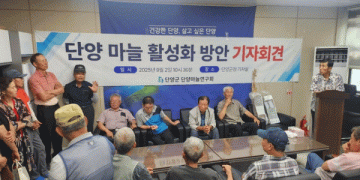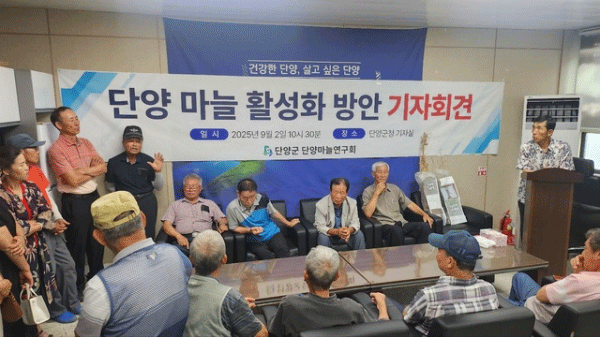A significant conflict has emerged in South Korea’s Danyang County, where the implementation of a “Premium Danyang Garlic Project” has created deep divisions between local garlic farmers and agricultural authorities. The dispute centers around preserving the genetic integrity of heritage garlic varieties while addressing the realities of climate change and commercial production pressures.
The Core Conflict
The Danyang Garlic Research Association, representing local farmers, has raised serious concerns about the county’s management of the seed garlic production support program. Their primary grievances include:
- Genetic contamination: Spread of foreign varieties like Hongsan, Tongtong, and Dasan instead of preserving native Hanji-type garlic
- Management transparency: Geographical indication management rights delegated to a specific agricultural corporation for over 20 years
- Selection process fairness: Questionable evaluation procedures that rejected 11 out of 14 applicants in the recent specialized seed production farm pilot project
The farmers argue that recent abnormal climate conditions have caused rare variations in native garlic, which evaluators mistakenly identified as foreign hybrid contamination. They claim this reflects insufficient understanding of local growing conditions and climate impacts on crop genetics.
Scientific Context and Climate Impacts
Research published in the Journal of Agricultural Science (2024) indicates that climate change is indeed affecting garlic cultivation in several ways:
- Temperature fluctuations can cause phenotypic variations in garlic without genetic alteration
- Stress-induced morphological changes may resemble characteristics of other varieties
- Genetic purity testing requires sophisticated molecular methods beyond visual inspection
The International Garlic Research Consortium reports that many heritage garlic varieties worldwide are experiencing similar challenges, with 35% of documented heritage strains showing climate-related phenotypic changes over the past decade.
Economic Stakes and Market Position
Danyang garlic holds geographical indication status, providing premium market positioning that commands 40-60% higher prices than conventional garlic. Maintaining genetic purity is therefore not just an agricultural concern but an economic imperative. Studies show that:
- Consumers are willing to pay 25-45% premiums for verified heritage varieties
- Genetic contamination incidents can reduce market confidence by 30-50%
- Proper preservation programs can increase farmer income by 20-35%
Technical Challenges in Variety Preservation
The county maintains that its strict evaluation process is necessary to preserve the Danyang heritage variety’s purity and quality. Their position is supported by several technical considerations:
- Visual identification of “atypical plants” during field inspections
- Concerns about gradual genetic drift through unauthorized variety introduction
- Need for standardized production protocols to maintain quality consistency
However, modern agricultural science suggests that more sophisticated approaches might be necessary. DNA-based verification methods, now costing less than $50 per sample, could provide more accurate assessments than visual field inspections.
Global Best Practices in Heritage Crop Preservation
Other regions facing similar challenges have developed successful models:
- Italy’s heritage tomato preservation: Uses genetic fingerprinting and community-based monitoring
- France’s AOC system: Combines traditional knowledge with scientific verification
- Japan’s heritage rice program: Implements multi-stakeholder governance including farmers, scientists, and officials
These programs typically achieve 90-95% preservation success rates while maintaining farmer support and engagement.
Recommended Solutions and Path Forward
Based on successful international models, several approaches could address the current conflict:
- Implement DNA-based verification to objectively assess genetic purity
- Establish multi-stakeholder governance including farmer representatives
- Develop climate-resilient preservation protocols that account for environmental stresses
- Create transparent evaluation criteria shared with all stakeholders in advance
- Provide technical support for farmers maintaining heritage varieties
Economic Impact Assessment
The current conflict has significant economic implications. Research indicates that disputes over agricultural preservation programs can:
- Reduce program participation by 40-60%
- Decrease implementation effectiveness by 25-45%
- Delay beneficial outcomes by 2-3 growing seasons
- Damage stakeholder relationships requiring years to repair
The Danyang garlic conflict represents a microcosm of larger challenges facing heritage crop preservation worldwide. As climate change accelerates and commercial pressures intensify, the balance between genetic preservation and practical agriculture becomes increasingly difficult to maintain.
The solution lies in adopting more sophisticated, science-based approaches that respect both agricultural tradition and modern realities. By implementing DNA verification, inclusive governance, and climate-aware protocols, Danyang County could transform current conflicts into collaborative preservation efforts.
This case demonstrates that successful heritage crop preservation requires combining traditional farmer knowledge with modern scientific methods. Neither strict visual inspection nor complete laissez-faire approaches will suffice in the face of climate change and genetic complexity.
The ultimate goal should be developing resilient preservation systems that maintain genetic integrity while supporting farmer livelihoods and adapting to changing environmental conditions. This balanced approach offers the best chance for preserving Danyang’s agricultural heritage while ensuring its economic viability for future generations.































